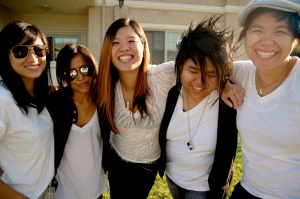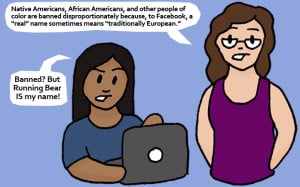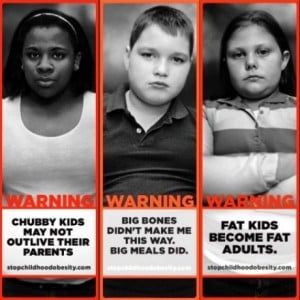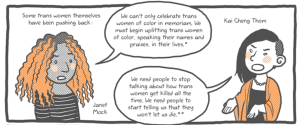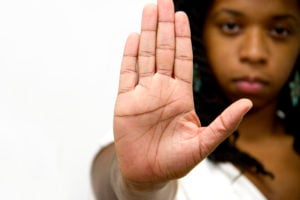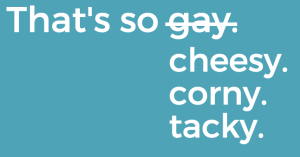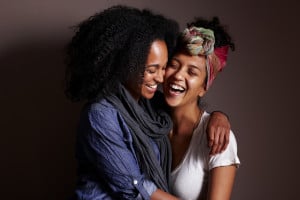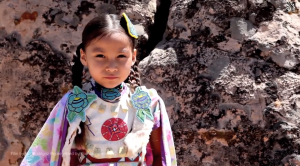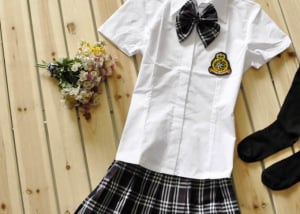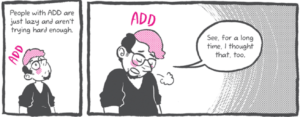Editor’s Note: The word queer as used in this article refers to sexual orientation. In the future, Everyday Feminism will publish more articles focused on self-acceptance for trans and gender non-conforming people.
We’re seeing more and more stories of queer people coming out, being visible, and affirming their right to exist in the media, sports, religion, politics — everywhere.
But even as some of us are making public strides, there are queer people still struggling to accept themselves in the midst of open hostility, a lack of support, and isolation.
If you’re currently struggling to get to a place of self-acceptance, no one can really promise you that things will get better with the passage of time. Self-acceptance is a form of resilience, an acknowledgment of a deeply known inner truth that isn’t swayed by negativity or mistreatment.
And whether the challenges of being queer ease up or intensify in the future, we have more strength to face them when we know and accept ourselves.
But self-acceptance is a thing easier said in platitudes than done. I know from my own experience and from talking with other queer folx that many of us internalize feelings of shame about ourselves, a fear of being seen and known as we really are.
When I was around twelve or so, I used to read a Bible study book called Young People Ask that had biblical answers to questions like, “How do I make friends?” or “What if someone offers me drugs?” or “What do I do if I think I’m gay?”
The latter was the subject of an entire chapter of the book, which was probably the most frayed and earmarked from the number of times I flipped to it.
I was anxious about “becoming” gay and took comfort in the testimonies of young people who struggled with same-sex desire and eventually entered heterosexual Christian marriages — well on their way to surviving Armageddon.
This was the narrative that was available to me as a kid with a lot of questions and no queer friends or role models: Pray or repress your sexuality hard enough and it just disappears.
But it didn’t disappear.
It took me years to accept that yes, I’m queer; no, it’s not a bad thing; and wow, poor twelve-year-old me.
And on the way to getting from repressed twelve-year-old to kind-of-well-adjusted adult, here are some of the things that helped the most.
1. Find Your People
If you’re at all able to find respectful people who don’t make you feel less-than, don’t bombard you with microaggressions, are easy to talk with, and make an effort to treat you in ways that you ask to be treated, surround yourself with them and offer them the same.
Other queer folx won’t always be your people, and your people might not always be queer, but finding or accessing spaces where you are allowed to be yourself can be affirming in a lot of ways.
If you know people you can trust to be supportive, reach out to them. Build and value those relationships. If you live smack dab in the middle of Homophobia Central, Bigotland where no one is out, you still have access to the Internet and its many forums, chat rooms, and links to hotlines and resources for queer people.
I say this because it’s not unusual for queer people to feel isolated or socially withdraw in a society that marginalizes us. As human beings, we need support systems for our mental health, and there are times when we have to create them for ourselves.
Finding your people — those who you feel you can be yourself around — means knowing and communicating how you want to be treated.
If people claim to be supportive of you, but repeatedly do things that make you uncomfortable, minimize your feelings, tokenize you, or otherwise stress you out, call them out on it or distance yourself from them.
Be selective about who you’re open with, when you compromise, and what you put up with. Don’t buy the hype that marginalized people should accept scraps of affection and heaps of abuse from people who claim to support them.
2. Be Unapologetic
Have you ever heard people say that such-and-such person is “brave” for being themselves in the face of bigotry? Do you find them as annoying as I do?
Being who you are and unapologetic about it isn’t born of bravery. It’s born of necessity.
There’s a paradox in wanting to be treated with respect and value while apologizing for who we are, yet that’s what happens when we internalize queerphobia.
No one wants to feel safe from bigoted violence if it’s not too much trouble, or have their relationships treated as valid if it’s convenient for straight people, or treated as human if we play by heteronormative rules.
People who are self-accepting want and need equal protections, equal rights, and equal recognition of their humanity. That means resisting toxic messages that urge queer people to hide, feel ashamed, or apologize for being queer.
I don’t mean to say that all queer people must come out to all people at all times and remind everyone of how queer they are and how awesome it is. It’s neither safe nor necessary for most of us to do this.
What I’m saying is that even if you’re in the closet, questioning, or not quite comfortable with where you are in life in the moment, nothing in your life need revolve around making straight cis people comfortable.
Prioritize your needs as much as anyone else does — and without hesitation and apology.
3. Adopt, Reject, or Forgo Labels
There are many labels that fall under the LGBTQIA+ umbrella, many of which are umbrella terms themselves. A lot of people have mixed feelings about labels. Some find them confusing and confining, others helpful and illuminating.
I can’t speak for everyone, but I’ve found that self-labeling makes it easier for me to understand and explain my sexuality to people on my own terms.
I’ve gone from identifying as straight by default to “what is happening in my pants” to bisexual to queer over the past twelve years, and the changes in labels have had more to do with better understanding what those words meant than any shift in what I felt.
But for others, trying to find the exact words to describe their sexual orientations and gender identities and sexualities feels like trying to hit a moving target. There are ways of being and feeling in relation to gender and sexual orientation that we don’t have words handy for, and that’s okay.
Self-acceptance for queer people doesn’t necessarily mean having a fixed label, adopting the labels that are pushed on you by others, or rejecting all labels in all circumstances and becoming kumbaya personified.
It’s okay to label yourself. It’s okay to adjust those labels. It’s okay to be kind of vague like me and just call yourself “queer” if that makes the most sense for you.
You generally know yourself better than other people do.
And while I’m definitely not okay with labeling ourselves in ways that are appropriative or oppressive, I do think it’s important that people don’t feel policed or pressured into adopting an identity that doesn’t ring true for them (as in people telling bisexuals to pick a side).
***
The thing about self-acceptance is that it’s easier to talk about in hindsight than it is to cultivate. And we don’t all have equal access to the time, resources, and self-reflection needed to get to a mentally healthy place.
But accepting who you are as a queer person can lay the foundation for engaging with and creating community, taking care of yourself, being seen and heard.
There’s a lot of power in it — even if the road to get there is littered with the many obstacles that heteronormative society may throw in your path. So yes, the years and the doubts and the setbacks that one goes through are worth it.
Unfortunately, the process of self-acceptance is more personal and complicated than a 1400-word article on an online magazine written by a single person can ever hope to cover.
So if you’re reading this article and have some words of advice for those journeying toward self-acceptance or want more specific articles and resources in the future, share it in the comment section!
Resources
[do_widget id=”text-101″]
Jarune Uwujaren is a Contributing Writer for Everyday Feminism. A Nigerian-American recent graduate who’s stumbling towards a career in writing, Jarune can currently be found drifting around the DC metro area with a phone or a laptop nearby. When not writing for fun or profit, Jarune enjoys food, fresh air, good books, drawing, poetry, and sci-fi. Read their articles here.
Search our 3000+ articles!
Read our articles about:
Our online racial justice training
Used by hundreds of universities, non-profits, and businesses.
Click to learn more


